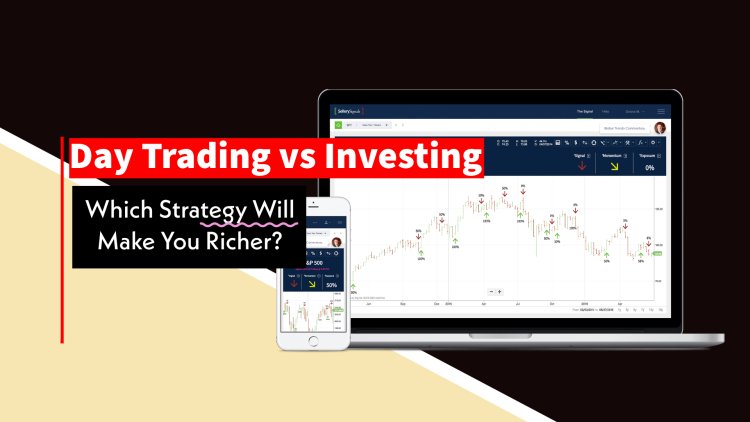Day Trading vs Investing: Which Strategy Will Make You Richer?
Enter the high-stakes world of Day Trading vs Investing. Discover which strategy suits your financial goals and could make you richer. Read on!

Day Trading vs. Investing: Which Strategy Will Make You Richer?
Welcome to the world of financial markets, where the phrase "buy low, sell high" reigns supreme. When it comes to growing your wealth, there are two main approaches: day trading and investing. While both strategies offer the potential for significant gains, they differ significantly in terms of philosophy, risk tolerance, and time commitment.
Day trading involves buying and selling financial instruments, such as stocks, within the same trading day. It requires quick decision-making, market analysis, and the ability to profit from small price movements. Investing, on the other hand, is a long-term strategy focused on gradually growing your wealth over time. It prioritises patience, discipline, and thorough research.
In this article, we'll explore the differences between day trading and investing and help you determine which strategy is better suited for your financial goals. We'll examine the risks and rewards associated with both approaches, as well as the importance of education and continuous learning.
Key Takeaways:
- Day trading involves buying and selling financial instruments within the same trading day.
- Investing is a long-term strategy focused on growing wealth over time.
- Both approaches have their own set of risks and rewards.
- Educating oneself and staying informed are crucial in both day trading and investing.
- Your financial goals, risk tolerance, and time commitment will determine which strategy is best for you.
What is day trading?
Day trading is like a rollercoaster ride in the stock market. It's not for the faint of heart, but if you're up for the thrill, it can be a lucrative strategy.
Essentially, day trading involves buying and selling stocks within the same trading day. The goal is to take advantage of small price movements, making quick profits before the market closes. It's a fast-paced game that requires careful market analysis, razor-sharp decision-making, and a solid understanding of day trading strategies that work.
Day Trading Tips for Beginners
If you're new to day trading, don't jump in blind. Here are some essential tips to help you get started:
- Research, research, research: Before you start trading, educate yourself on the stock market and the companies you plan to invest in. Stay up-to-date on current events and industry news that may impact the market.
- Develop a strategy: Day trading requires a well-planned strategy. Identify your goals, set limits, and be disciplined in your approach.
- Practice makes perfect. Use a practice trading account to test out your strategy before risking real money. This will allow you to fine-tune your approach and gain confidence in your abilities.
Following these tips can help set you up for success in day trading.
Day Trading Courses
If you're serious about day trading, consider investing in a day trading course. These courses provide in-depth education on the stock market, strategies, and risk management. They can be costly, but the knowledge gained can be priceless.
When choosing a day trading course, do your research and read reviews from other traders. Look for courses that offer real-time trading simulations and one-on-one coaching for optimal learning.
Remember, day trading is not for everyone. It requires a significant time commitment, a high tolerance for risk, and the ability to stay cool under pressure. But if you have what it takes, day trading can be a thrilling and rewarding way to potentially grow your wealth in the stock market.
The Basics of Investing
So, you're interested in investing? That smart move, my friend. Whether you're looking to grow your wealth or plan for retirement, investing in the stock market can provide significant long-term returns. But before you get started, there are a few basics you need to know.
First things first, let's talk about online trading. With the rise of technology, it's now easier than ever to invest in the market from the comfort of your own home. All you need is an online trading account, and you can start buying and selling stocks in no time.
Now, when it comes to investing in the stock market, it's important to have a clear understanding of your investment goals. Are you looking for short-term gains or long-term growth? Are you willing to take on more risk for potentially higher returns?
Once you have a clear idea of your investment goals, it's time to conduct research. Look into different companies and industries, and keep an eye on market trends and economic outlooks. This information can help you make informed decisions about which stocks to invest in.
It's also important to diversify your investment portfolio. Don't put all your eggs in one basket (unless it's a really big basket). A well-diversified portfolio spreads your risk across different companies and industries, reducing the impact of any single stock's performance on your overall portfolio.
If you're still feeling unsure about investing, don't fret. There are plenty of investment tips and resources available to help you along the way. From online forums to investment courses, there's no shortage of information out there to help you become a savvy investor.
"The stock market is a device for transferring money from the impatient to the patient." Warren Buffet
Remember, investing in the stock market is a long-term game. It takes patience, discipline, and a willingness to weather the ups and downs of the market. But with the right approach, investing can be a powerful tool for growing your wealth.
Risk and Reward in Day Trading
Day trading is like playing a game of poker; it involves calculated risks and the possibility of significant rewards. But just like poker, it's important to have a solid understanding of the game and some effective trading techniques to avoid losing your shirt.
One of the biggest risks in day trading is the temptation to go all-in on a single trade. Novice day traders may fall into the trap of trying to make a quick profit by investing in a single stock or making impulsive decisions based on emotions.
That's why it's crucial to have a sound day trading strategy in place. One popular technique is to use technical analysis to identify short-term price movements and then act quickly to capitalise on those trends.
Another crucial aspect of day trading is risk management. Setting stop-loss orders and taking profits at the right time can help minimise losses and maximise gains.
Pro Tip: Always have a plan before entering a trade, including your exit strategy, and stick to it no matter what.
For beginners, it's important to start small and gradually increase trading volume as you gain experience. Also, make sure to invest in quality day trading courses and education materials to hone your skills and minimise risks.
Day Trading Stocks vs. Other Financial Instruments
While most day traders focus on stocks, it's important to note that other financial instruments such as options, futures, and forex can also be lucrative day trading opportunities.
Each of these financial instruments has its own unique set of risks and rewards, so it's important to do your research and understand the nuances of each market before diving in.
Pro Tip: Don't put all your eggs in one basket. Diversify your day trading portfolio by investing in multiple financial instruments and sectors.
The Importance of Day Trading Courses for Beginners
Day trading can be intimidating for beginners, but don't let that stop you from pursuing your financial goals. Investing in quality day trading courses can help you gain the knowledge and confidence needed to succeed in the stock market.
Look for reputable day trading courses that offer comprehensive education on trading strategies, risk management, and market analysis. You can also seek out mentorship from experienced day traders or join a trading community to gain valuable insights and support.
"The stock market is a device for transferring money from the impatient to the patient." Warren Buffet
Ultimately, successful day trading requires a balance of risk-taking and discipline. By following effective trading techniques, minimising risks, and investing in your education, you can maximise your potential for high returns and financial success.
The Benefits of Investing for the Long Term
When it comes to investing, time is the ultimate ally. Though investing involves a certain level of risk, a long-term perspective can offset the potential downsides. Here are some of the benefits of investing for the long term:
- Power of Compound Interest: Investing over a longer period allows you to take advantage of compound interest, where the interest earned is reinvested, leading to exponential growth. Over time, even small investments can grow significantly.
- Diversification: A diversified portfolio allows you to spread risk and minimize the impact of any single stock's performance. This is a crucial component of successful long-term investing.
- Patience Pays Off: Short-term investing is often characterized by quick gains and losses. With a long-term strategy, you're more likely to weather short-term fluctuations and benefit from the overall upward trend of the stock market.
Of course, successful investing requires a well-informed approach. Here are some tips to help you get started:
- Set clear investment goals: Before investing, determine your financial goals and risk tolerance. This will help you choose investments that align with your objectives.
- Conduct thorough research. Don't invest blindly. Research companies, analyse financial statements, and study industry trends to make informed investment decisions.
- Stay Informed: Keep abreast of the latest stock market analysis and financial news to stay ahead of the curve.
"In the short run, the market is a voting machine, but in the long run, it is a weighing machine." Benjamin Graham
By adopting a long-term investing mindset and staying informed, you can potentially reap the rewards of a carefully constructed investment portfolio.
Day Trading vs. Investing: Which Strategy Fits Your Financial Goals?
Ah, the age-old question: day trading or investing? The answer isn't always clear, but it all depends on your personal financial goals. Let's dive deeper into the nuances between day trading and investing, examining their respective strategies and exploring which one may be the best fit for you.
The Fast-Paced World of Day Trading
Day trading is like a rollercoaster ride—thrilling, suspenseful, and not for the faint of heart. This short-term strategy involves buying and selling financial instruments, such as stocks, within the same trading day to profit from small price movements. If you have a high-risk tolerance, quick reflexes, and a knack for analysing market trends, day trading may be an option worth exploring. But beware: the potential for large gains also comes with the potential for large losses.
When it comes to day trading strategies, there are endless possibilities, from scalping to position trading and everything in between. It's important to do your research and understand which strategies align with your financial goals. And don't forget the importance of education! There are plenty of day trading courses available to help sharpen your skills and give you the edge you need to succeed in the stock market.
The Basics of Investing
Investing, on the other hand, takes a more long-term approach to building wealth. It involves buying and holding assets, such as stocks and bonds, with the intent of growing your portfolio over time. It's less of a thrill ride and more of a slow and steady climb, but the rewards can be just as lucrative—if not more so.
When it comes to investing, it's crucial to have a solid understanding of online trading platforms, stock trading fundamentals, and investment tips. Conducting thorough research and constructing a well-diversified portfolio are also keys to success. With the power of compound interest on your side, even small investments can grow significantly over time.
Which strategy is right for you?
It all boils down to your financial goals and risk tolerance. If you thrive in a fast-paced environment and can handle the highs and lows of day trading, it may be worth exploring as an option. But if you're looking for a more stable and long-term approach to building wealth, investing is likely a better fit.
Ultimately, there's no right or wrong answer. Both day trading and investing are viable strategies for growing your wealth, but they require dedication, knowledge, and a sound understanding of the stock market. So which one will you choose? The decision is yours.
Getting Started with Day Trading
So, you're ready to take the plunge and start day trading? Excellent! But before you jump in, you need to understand the basics. Day trading for beginners can be a bit overwhelming, but fear not—we've got you covered.
Equip yourself with the right tools.
The first step in your day-to-day trading journey is ensuring you have the right tools. You'll need a reliable computer, a high-speed internet connection, and a trading platform that suits your needs. A quick Google search will reveal a plethora of options—some even offer demo accounts to help you practice before trading with real money!
Find the perfect brokerage platform.
Choosing the right brokerage platform is crucial to your success as a day trader. Look for a platform that offers low fees, a user-friendly interface, and real-time market data. Some popular options include E-Trade, TD Ameritrade, and Fidelity. Do your research and find the best one for you.
Selecting suitable stocks for day trading
The key to successful day trading is selecting the right stocks to trade. Focus on high-volatility stocks with plenty of liquidity. Stocks that trade on the NASDAQ or NYSE are a good place to start. Keep an eye on news and events that could influence the stock price, and always perform your due diligence.
Practice makes perfect.
Before risking real money, it's essential to practice your trading strategies. Many brokerage platforms offer demo accounts where you can trade with virtual money, allowing you to gain valuable experience and refine your skills without taking any financial risks.
Invest in your education.
Day trading isn't something you can learn overnight. It requires dedication, discipline, and a willingness to learn. Investing in a reputable day trading course can help you develop the knowledge and skills needed to succeed in this fast-paced environment. Don't skimp on your education!
"A wise trader knows that practice makes perfect and education is essential. Don't make the mistake of diving headfirst without honing your skills first."
Embarking on Your Investing Journey
Congratulations! You've decided to embark on an exciting journey towards building your wealth through investing in the stock market! To begin, you'll need to open an online trading account with a reputable brokerage platform. This will give you access to a variety of investment opportunities, including stocks, bonds, and mutual funds.
Before you start investing, it's essential to understand your investment goals. Are you looking for long-term growth or a regular income? High-risk, high-reward, or low-risk, low-reward investments? Once you have a clear idea of your goals, you can start researching and analyzing potential investments.
"The stock market is a device for transferring money from the impatient to the patient." Warren Buffet
As Warren Buffett famously said, investing requires patience. This means taking the time to conduct thorough research, analyze financial statements, and keep a close eye on market trends. It's also crucial to have a well-diversified portfolio, which means spreading your investments across different asset classes to minimise risk.
Here are some investment tips to keep in mind:
- Don't invest more than you can afford to lose.
- Have a long-term perspective.
- Avoid making impulsive decisions based on emotions.
- Stay informed about market developments.
- Don't put all your eggs in one basket; diversify your portfolio.
Educating yourself on the various investment products and strategies available is also critical to making informed decisions. Online trading platforms often offer educational resources and research tools to help you stay informed.
Remember, investing is a journey, not a sprint. It requires discipline, patience, and a willingness to learn. By following these investment tips and staying informed, you can take the first steps toward growing your wealth in the stock market.
Staying Informed: Day Trading and Investing Resources
Continuous learning is essential for successful day trading and investing. There is always more to learn and new tools to help you improve your strategies. Here are some resources to keep you informed:
Day Trading for Beginners
- Day Trading 101: A Beginner's Guide
- DayTrading.com is an extensive online course to teach you the basics of day trading.
Day Trading Courses
"An investment in education pays the best interest." Benjamin Franklin
Investing in a quality day trading course can help you refine your skills and increase your profits. Here are some of the most respected courses:
|
Course |
Focus |
Price |
|---|---|---|
|
Warrior Trading |
Stock trading, day trading strategies |
$997 - $4,297 |
|
Investopedia Academy |
Stock trading, technical analysis |
$199 - $497 |
|
Udemy |
Various topics, including stock trading and technical analysis |
$10 - $200 |
Stock market analysis
Keeping up with the latest news and trends in the stock market is crucial for informed decision-making. Here are some websites to help you stay informed:
- CNBC: 24-hour coverage of the financial markets
- MarketWatch: real-time financial news and analysis
- Bloomberg Markets: In-depth financial news and analysis
Investment Tips
Investing can be overwhelming, especially if you're just starting out. Here are some valuable tips to guide you:
- Don't put all your eggs in one basket; diversify your investment portfolio to minimise risk.
- Invest regularly, even in small amounts; the power of compound interest can work wonders over time.
- Do your research. Before investing in any company, conduct thorough research to ensure it aligns with your investment goals.
Conclusion: To day trade or to invest, that is the question.
Congratulations on making it to the end of our witty exploration of day trading vs. investing. Hopefully, by now, you have a better understanding of the two strategies and whether day trading or investing aligns better with your financial goals.
Choose Wisely
Remember, both day trading and investing present potential opportunities for accumulating wealth. The key is to evaluate your financial objectives, tolerance for risk, and time commitment. If you're comfortable with quick decisions and market volatility, day trading may be the right fit. But if you're looking for long-term growth and stability, investing could be the better choice.
Continuous learning for continuous growth
Regardless of which path you choose, remember that continuous learning is essential for success in the financial markets. Stay informed with the latest news, insights, and trends by regularly reading articles, attending webinars, or taking courses.
So, what's it going to be?
At the end of the day, the choice between day trading and investing ultimately comes down to you. We hope this article has given you valuable insights to make an informed decision on your journey towards financial prosperity.
Now, it's time to choose your path and take action. Good luck and happy trading, whether you're day trading or investing!
FAQ
What is day trading?
Day trading is a short-term trading strategy where traders buy and sell financial instruments, such as stocks, within the same trading day. It requires keen market analysis, quick decision-making, and the ability to profit from small price movements.
What is investing?
Investing is a long-term strategy focused on growing wealth over time. It involves buying and holding financial assets, such as stocks, with the expectation of generating a return through dividends, interest, or capital appreciation.
What are the risks of day trading?
Day trading involves unique risks, including the potential for significant financial losses. The fast pace of trading, market volatility, and emotional pressures can increase the likelihood of making impulsive decisions and incurring losses.
What are the benefits of investing for the long term?
Investing for the long term offers advantages such as the power of compound interest, the potential for consistent returns over time, and the opportunity to build wealth through diversified portfolios. It allows investors to take advantage of market trends and withstand short-term fluctuations.
Which strategy should I choose—day trading or investing?
The choice between day trading and investing depends on your financial goals, risk tolerance, and time commitment. Day trading offers the potential for quick profits but involves higher risks and demands constant attention. Investing is a more passive approach focused on long-term wealth accumulation. Consider your circumstances and objectives before deciding on a strategy.
How do I get started with day trading?
To get started with day trading, you'll need essential tools such as a reliable brokerage platform and real-time market data. It's important to find the right platform, select suitable stocks for trading, and practice with virtual accounts before risking real money.
How do I embark on my investing journey?
To embark on your investing journey, open an online trading account, define your investment goals, conduct thorough research on stocks and market trends, and build a diversified portfolio. Whether you're a beginner or experienced, these steps will set you on the right path.
What resources can help me stay informed about day trading and investing?
There are various resources available to stay informed about day trading and investing. Reputable day trading courses can enhance your skills, while stock market analysis websites offer valuable insights. Stay updated with financial news, read books on trading and investing, and join communities of like-minded individuals.
Is day trading or investing a better strategy?
Day trading and investing are both valid strategies, but the better choice depends on your individual circumstances. Day trading offers the potential for quick profits but involves higher risks while investing is a more passive approach focused on long-term wealth accumulation. Consider your financial goals, risk tolerance, and time commitment to make a decision.
What should I consider before choosing day trading or investing?
Before choosing between day trading and investing, evaluate your financial goals, risk tolerance, time commitment, and ability to handle market volatility. Consider whether you prefer active or passive investment approaches and whether you have the necessary knowledge and skills for day trading.
Disclaimer: The information provided in this article is for educational purposes only and does not constitute financial advice. Always conduct thorough research and consider consulting with a qualified financial advisor before engaging in day trading or making investment decisions.
If you do not want to experience the Monday blues, join our fund management programme and never work again.
TradeFxP Features
If you choose to be a self-employed retail trader, here are a few things we offer:
- The best trading platform
- No Requotes
- Lowest Spreads
- High-level liquidity
- Interbank connectivity
- Pure STP/DMA/ECN
- Free signals
- Best support
- Crypto Wallet and withdrawals / Deposits (USDT)
- Robust CRM
- TradeFxP wallet
- Once click withdrawal
- Multiple payment options
- Local offices to walk in
- Free VPS
- Free Video Chat / Virtual Meetings
- And many more…
If you choose to be a part of our managed account programme,
- All of the above +
- 1-2% Daily Profits
- High-level risk management
- Capital protection
- Only 30% of the capital used
- Negative balance protection
- Our fee is from the profits only
- Monthly profit withdrawal
- Wallet system – Use it like Phonepe, or Google Pay
- Crypto wallet and withdrawals / Deposits (USDT)
- Live monitoring
- MyFxbook Live monitoring
- Copy Trading
- And many more…
Optional: If you do not withdraw your profits for 2 months, our system will use those profits to trade and will keep your 100% capital safe and secure for margin purposes. This is optional, and if you choose not to be a part of it, you can withdraw your profits from the first month itself.
Why 1-2% daily? Can't your managed forex account earn more?
Yes, we can! Remember: greed may be good in the beginning, but in the end, it will destroy everything. You and I know that! Many droplets make an ocean! Join the Managed Account Programme and sit back for six months, then look at your account. You'll see that our strategy is good and the best. Do you know what I mean?
If you choose to be a part of us as an introducing broker (IB) or channel partner,
- Industry-best rebates
- Local Office support
- Staff support
- Marketing support
- Marketing materials
- And many more…
Having said that,
You can join our Forex Managed Account programme and earn 1-2% profits daily. See for yourself by clicking the below link.
Have a great journey, and may you catch some big waves on your way to prosperity!
To see Ai Forex Trading for real, use these credentials.
- Low-risk strategy:
- Mt4: 112018
- Pw: Allah@101
- Server: TradeFxP live,
1. To read why you should be with us, click here.
2. To open an account, click here.
3. To see our regulation certificate, click here.
4. To see our news with the IFMRRC, click here.
5. For claims, click here.
6. For the main site, click here.
7. For blogs and articles, click here.
8. Main Website: www.TradeFxP.com



 admin
admin 










